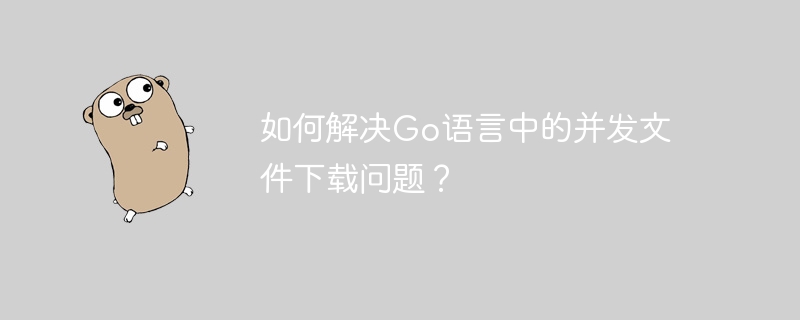

How to solve the problem of concurrent file downloading in Go language?
In daily development, we often encounter situations where we need to download multiple files. How to use the concurrency features of Go language to improve the efficiency of file downloading is a problem we need to face. This article will introduce how to use Go language to solve the problem of concurrent file downloading, and provide specific code examples.
First of all, we need to clarify the basic process of file downloading. Usually, we can download files from remote servers through HTTP protocol. The basic download process is as follows:
In the case of a single file download, the process is relatively simple and straightforward. But when downloading multiple files concurrently, we need to consider how to manage concurrent requests and download tasks to make the download process more efficient.
In order to achieve the purpose of concurrent downloading, we can use the goroutine and channel of the Go language. Goroutine is a lightweight thread in Go language that can perform multiple tasks at the same time. Channels are the mechanism used to communicate between goroutines.
The following is a sample code that demonstrates how to use goroutine and channel to implement concurrent file downloads:
package main import ( "fmt" "io" "net/http" "os" ) func downloadFile(url string, filename string, ch chan<- string) { resp, err := http.Get(url) if err != nil { ch <- fmt.Sprintf("Error downloading file from %s: %s", url, err.Error()) return } defer resp.Body.Close() file, err := os.Create(filename) if err != nil { ch <- fmt.Sprintf("Error creating file %s: %s", filename, err.Error()) return } defer file.Close() _, err = io.Copy(file, resp.Body) if err != nil { ch <- fmt.Sprintf("Error writing file %s: %s", filename, err.Error()) return } ch <- fmt.Sprintf("File %s downloaded successfully", filename) } func main() { urls := []string{"http://example.com/file1.txt", "http://example.com/file2.txt", "http://example.com/file3.txt"} ch := make(chan string) for _, url := range urls { go downloadFile(url, url[17:], ch) } for i := 0; i < len(urls); i++ { result := <-ch fmt.Println(result) } }
In this sample code, we define adownloadFilefunction , used to download files. This function receives a URL and a file name, downloads the file from the URL through an HTTP GET request, and saves the file locally. After the download is completed, the download result will be returned through channelch.
In themainfunction, we define a URL list and use thedownloadFilefunction to download these files concurrently. Download results are passed and received through the channel and printed in the console.
By running this sample code, you will find that the downloading process of files is carried out at the same time, and the download results will be printed in the order in which the download is completed.
By using goroutine and channel, we can easily achieve concurrent downloading of files. This not only improves download efficiency, but also ensures the order of download results.
Summary: This article introduces how to use Go language to solve the problem of concurrent file downloads, and provides specific code examples. I hope that through this example, readers will have a preliminary understanding of how to use goroutine and channels to implement concurrent downloads, and further explore the concurrency features of the Go language. At the same time, readers can also customize and expand it according to their actual needs.
The above is the detailed content of How to solve the problem of concurrent file downloading in Go language?. For more information, please follow other related articles on the PHP Chinese website!
 Usage of Type keyword in Go
Usage of Type keyword in Go How to implement linked list in go
How to implement linked list in go What are the Go language programming software?
What are the Go language programming software? How to learn go language from 0 basics
How to learn go language from 0 basics What are the methods to implement operator overloading in Go language?
What are the methods to implement operator overloading in Go language? What are the operators in Go language?
What are the operators in Go language? My computer can't open it by double-clicking it.
My computer can't open it by double-clicking it. Which platform does Tonglian Payment belong to?
Which platform does Tonglian Payment belong to?



